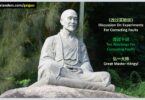善谈心性,不离因果
[252] [Those] Good [At] Discussing Mind-Nature [Do] Not Depart [From] Cause [And] Effect
世出世间之理,不出心性二字。世出世间之事,不出因果二字。
Of worldly [and] world-transcending principles, [they do] not go [beyond] mind-nature, [these] two words. Of worldly [and] world-transcending practices, [they do] not go [beyond] cause [and] effect, [these] two words.
(断无有无因而得果者,亦断无有作善业而得恶果者。见《正编·劝爱惜物命说》)
([There are] absolutely none [of] those without [the] cause, then attaining [the] effect, also absolutely none [of] those creating good karmas, then attaining evil effects. See [the] ‘First Compilation’s Teaching [On] Encouragement [To] Cherish Sentient Beings’ Lives’)
众生沉九界,如来证一乘,于心性毫无增减。
[On] sentient beings sinking [in the] nine realms, [and the] Thus Come [Ones who have] realised [the] One Vehicle, of [their] mind-natures, [they are] without [the] slightest increase [or] decrease.
[Note 1: The nine realms (九界) are the ten dharma realms without the Buddhas’ realm.
Ten Dharma Realms (十法界):
Four Noble (Enlightened) Realms (四圣):
(With the greater above, in descending order of spiritual greatness)
(x) Buddhas (佛陀)
(ix) Bodhisattvas (菩提萨埵 / 菩萨)
(viii) Pratyekabuddhas / Those By Conditions Awakened / Lone Awakeners (辟支佛 / 缘觉 / 独觉)
(vii) Voice-Hearers (Śrāvakas) / Arhats (声闻 / 阿罗汉 / 罗汉)
Six Ordinary Realms (六凡):
(vi) Heavenly Beings (天人)
(v) Asuras (阿修罗)
(iv) Human Beings (人)
(iii) Animals (畜生)
(ii) Hungry Ghosts (饿鬼)
(i) Hell Beings (地狱众生)]
[Note 2: The One Vehicle (一乘) refers to the eventual and conclusive principles and practices (理事) of the Great Vehicle (大乘), that deliver one and all to Buddhahood.]
其所以升沉迥异,苦乐悬殊者,由因地之修德不一,致果地之受用各别耳。
Their reasons [for] ascending [and] sinking [are] totally different, [with] suffering [and] joy far apart. [This is] only due [to] cultivated virtues of causal grounds not [being] one, leading [to] received benefits of fruition’s grounds each [being] different.
阐扬佛法,大非易事。唯谈理性,则中下不能受益。专说因果,则上士每厌闻熏。
Expounding [and] propagating [the] Buddha’s Dharma, [is] not [a] very easy matter. [If] only discussing principles’ nature, then [with those of] middle [and] lower [roots] not able [to] receive benefits. [If] focusing [on] speaking [about] cause [and] effect, then [with] those [of] high [roots] often disliking hearing [about them, to be] permeated [with them].
然因果、心性,离之则两伤,合之则双美。
However, [of] cause [and] effect, [and] mind-nature, departing [from] them [is] then [with] both harmed, [and] uniting them [is] then [with] both beautiful.
故梦东云:「善谈心性者,必不弃离于因果。而深信因果者,终必大明乎心性。此理势所必然也。」
Thus, Mèngdōng [i.e. Pure Land Tradition’s Twelfth Patriarch Great Master Chèwù (净土宗十二祖彻悟大师)] said, ‘Those good [at] discussing mind-nature, must not abandon [and] depart [from] cause [and] effect. And those [with] profound faith [in] cause [and] effect, [in the] end must [have] great understanding [of] mind-nature. These principles’ circumstances [are] those certain.’
净土宗十三祖印光大师
Pure Land Tradition’s 13th Patriarch Great Master Yìnguāng
《印光法师文钞》(正编):与佛学报馆书;
Dharma Master Yìnguāng’s Collected Writings (First Compilation): Letter For Buddhist Studies’ Newsletter Office;
印光大师文钞菁华录(第两百五十二则):八、释普通疑惑:论理事(第一则)
Record [Of] Great Master Yìnguāng’s Collected Writings’ Essence (252nd Short Section): 8th Chapter: Explanations [On] Common Doubts [And] Confusions: Discussion [On] Principles [And] Practices (1st Short Section)
[Ref: #252 / 8.1]
Namo Amituofo : Translation and notes by Shen Shi’an
下一部分
Next Part:
「心净则土净」之理事
[253] Principles And Practices Of ‘With The Mind Pure, Then Is The Land Pure’
https://purelanders.com/2025/06/04/253-principles-and-practices-of-with-the-mind-pure-then-is-the-land-pure
上一部分
Previous Part:
唯取适宜,有利无弊
[251] Only Accepting That Suitable, Has Benefits Without Harms
https://purelanders.com/2025/06/04/251-only-accepting-that-suitable-has-benefits-without-harms
完整典籍
Complete Text:
《印光大师文钞菁华录》
Record Of Great Master Yìnguāng’s Collected Writings’ Essence
https://purelanders.com/jinghualu





